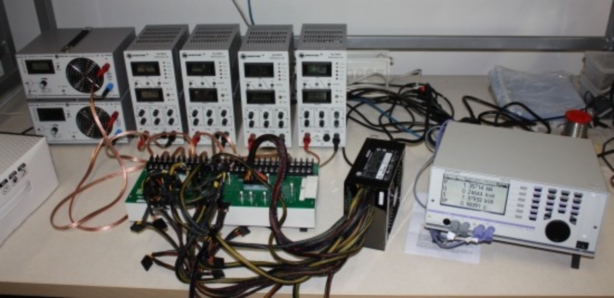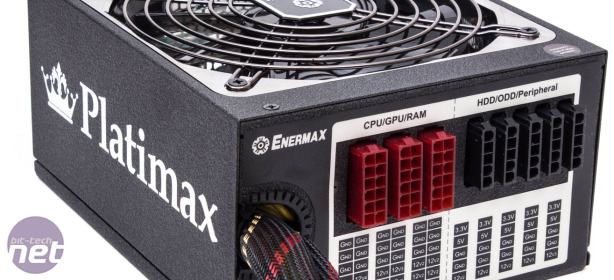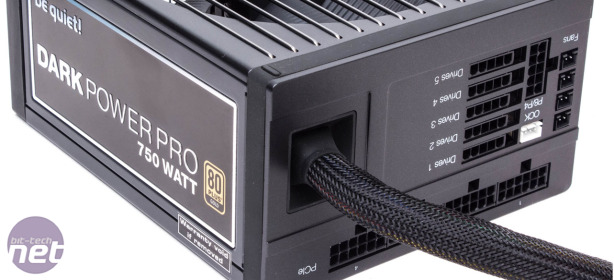What is the best 720-750W Power Supply?
April 26, 2013 | 09:57
Companies: #be-quiet #bit-tech #cooler-master #enermax #fractal-design #fsp #pc-power-cooling #seasonic #xfx

Introduction
While a 750W power supply is overkill for the average home computer, it's a reasonable capacity to opt for if you're touting more enthusiast level hardware. A rig with a fast Ivy Bridge CPU and a pair of Nvidia GeForce GTX 680 2GBs or AMD Radeon HD 7970 3GBs would be well suited to a 750W model, for example. Thus, while we wouldn't recommend a 750W PSU for every new build, if you have an eye on adding a second powerful GPU to your set-up in the future, it's useful to have this type of capacity.Choosing the right wattage for your PSU isn't the end of the story, however, as there are other factors to consider. Primarily, your power supply needs to be able to supply voltage to your hardware as stably as possible to avoid damaging it, and you want it to run as efficiently as possible too to save you money in the long run. Other things to consider are its noise output and the number and type of connections it has.
With these things in mind, we bring you our latest PSU round-up, featuring eight power supplies, each from a different manufacturer, that are rated at or around the 750W mark. There's about an £80 difference between the cheapest and most expensive models, so plenty of price points are covered, and as it's been a while since our last round-up, we're using a new testing methodology too.
How We Test
A PSU's ability to supply stable voltages across its rails, even under heavy load, is its most important asset. It sounds simple, but cheaper and poorly made PSUs often miss the mark, especially under heavier loads. Unstable voltages can cause your hardware to exhibit instabilities or even to become damaged, so the closer they are to what they should be, the better.Intel's desktop PSU design guidelines specify the physical and electrical characteristics that ATX PSUs are required (in theory, at least) to adhere to. It states there can be a maximum of 5 percent variation above or below the nominal voltage on the +12V, +5V and +3.3V rails. These are the rails we test, as they're the most relevant to modern systems. The +12V rail is tested using Stratron 3229 load generators, while the lower voltage ones are tested with on a Stratron 3227.
Beginning at 200W of load, we test each PSU in 100W increments recording the output voltages on each rail at every step, thus measuring a PSU's capability to provide stable voltages across various workloads. For the all important +12V rail, we take two measurements. 12V1 is the PSU's +12V connection with the lowest reading for each test setting, while 12V2 refers to the connection with the highest. As voltage output falls under heavier loads, 12V1 is the more crucial of the two.

Our test set-up
We also use a Zes Zimmer LMG95 power meter to determine how much AC power a PSU draws from the grid to output the appropriate DC power level. From this we calculate efficiency at each step, as well as an overall average efficiency. Efficiency is important not just because wasted energy is bad for your wallet and the environment, but because it's dissipated as heat which can reduce the lifespan and effectiveness of your components. Intel specifies that PSUs must be at least 70 percent efficient under full load, but 80 percent is recommended. We also use our power meter to test leakage levels by leaving the PSU on under no load.
The power supplied to each PSU in testing is 230V AC, the same as UK household mains electricity. It should also be noted that at each load interval, we draw 50W of power across each of the +3.3V and +5V rails, using the +12V rail to draw the remainder. This is different to the 80 Plus initiative's test protocols, whereby rails are loaded proportionally based on their individual rated DC output current. However, we're not testing whether each PSU deserves its 80 Plus rating, and our procedure still reflects the marginal role played by the lower voltage rails in today's systems.
For each load scenario, we also carry out a ripple test on the +12V line with an EasySync DS1M12 oscilloscope. Ripple refers to the tiny fluctuations in the output voltage of a power supply: an unavoidable result of converting AC to DC. A PSU's ability to suppress ripple is important, as high levels can damage your hardware, specifically the electrolytic capacitors found on motherboards and graphics cards, and reduce your overclocking potential. The maximum ripple permitted by Intel's specifications on the +12V rail is 120mV (peak-to-peak), but PSUs should be able to manage at least half this value to be considered excellent.
Finally, we also measure the noise output of each PSU under three different loads (100W, 300W and 500W) with a Brüel & Kjær 2238 decibel meter. This is done by isolating the power supply in a sound-proof box (where noise levels are 17 dB(A)). Measurements are taken from a distance of 10cm after five minutes of operation for the low power tests, and after twenty minutes for the 500W one.
How We Score
The voltage stability tests take pride of place in the scoring box and accounts for 40 percent of each PSU's overall score. The score is worked out as a percentage of the voltage measurements that are within the limits of Intel's specifications. We only recommend that you buy a PSU with 100 percent stability.The Design score factors in the average efficiency across each of the load scenarios (as well as leakage level under no load), the highest amount of ripple exhibited by the PSU and the amount of noise produced at the highest load level. As well as this, it also incorporates the number, type and quality of cables supplied with the unit. Finally, the Value score is simply a combination of the Stability and Design scores and the total rated output (in watts) divided by the price.

MSI MPG Velox 100R Chassis Review
October 14 2021 | 15:04










Want to comment? Please log in.